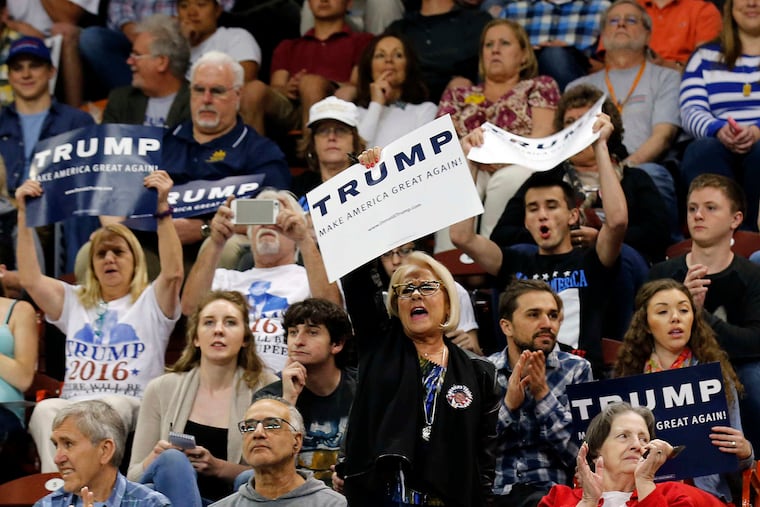As Trump campaigns, Philly should be on his itinerary | Opinion
Here, he can connect with a difficult but crucial demographic on whom his reelection will hinge: black voters.

From Central Florida to the Rust Belt, President Trump will be tempted to spend his time in friendly territory ginning up his base as he mounts a difficult reelection campaign. But when he next comes to the crucial swing state of Pennsylvania, he should skip Central Pennsylvania and come down to Philly instead. Here, he can connect with a difficult but crucial demographic on whom his reelection will hinge: black voters.
Candidate Trump’s pitch to urban voters, specifically black voters — a message of “what have you got to lose” that may have been blunt or even offensive to some — made small but significant inroads in the Keystone State and in others that decided the 2016 election.
Trump’s engagement, which included high-profile visits to meet with Philadelphia’s black GOP ward leaders -- I served as director of communications of the Philadelphia GOP at the time — contrasted with a GOP that has been quick to turn away from black voters due to frustration or lack of imagination.
Pennsylvania turned red for the first time in a generation due in no small part to Philadelphia, where Trump improved on Mitt Romney’s vote count by 16,000 votes (a quarter of his total margin in Pennsylvania), receiving some support in heavily-black wards where Romney didn’t manage a single vote in 2012.
The same effect could be seen in Michigan and Wisconsin, states that flipped for the first time in decades and which quite literally weren’t even on Hillary’s map. As the New York Times profiled in Milwaukee after the election, many black voters didn’t bother to show up for Hillary — and didn’t regret their decision.
As institutional loyalty cracks in American society, black voters, like all Americans, are becoming less beholden to political parties, with black men, in particular, being amenable to the Trump pitch. If campaign polling is to be believed, some one-third of these voters might support Trump in 2020 if they hear from the Republicans on the Criminal Justice Reform bill that Team Trump shepherded through Congress last year.
Could it be possible for the GOP to penetrate the richest and most consistent Democratic voting bloc of our era?
Between the criminal justice bill and a booming economy whose manufacturing rebound has disproportionately benefited blue-collar workers, there is a compelling story to tell.
It’s a story that stands in contrast to a Democratic Party that is veering sharply to the left, driven by the fixations of a mostly-white progressive elite. The Democrats’ staunch opposition to family school choice, insistence on sheltering illegal immigrants convicted of unrelated crimes, enthusiasm for abortion rights into the late second and third trimesters, and obvious distaste for religious “dogma” could sit badly with a great number of African Americans and other socially moderate or conservative Democrats.
But while President Trump has been eager to drum up his base in rural Pennsylvania and elsewhere, he has not been a presence in places like Philadelphia — where if voters aren’t hearing directly from him, they’re surely taking in a left-leaning media establishment’s more bellicose version of events.
And with a state Republican Party in shambles and hometown favorite Joe Biden leading in the Democratic polls, Republicans will require some creative thinking to take home the Keystone State again in 2020.
The GOP does not have to win the black vote in 2020. Even getting to 20 percent, from the standard single digits or low teens, would be a major achievement that could shift states like North Carolina, Virginia, and Pennsylvania our way — not to mention an increasingly perilous congressional map that flipped for the Democrats last year.
Even more importantly, Republicans need these voters not as a supplement to the base, but because we will lose without them. That’s because, from Pennsylvania to Virginia to Texas, other demographic groups — particularly educated white women — have fled, and they’re not coming back until the Republican Party sheds its image as a party of bigots. Engaging with and appealing to long-neglected urban minority communities will go a long way toward this effort.
In communities across the nation, some black voters are “coming out” as Trump Republicans. And even more are listening quietly, perhaps ready to be peeled off as first-time Republican voters in 2020, if they are approached consistently and respectfully, listened to, and know that their votes will translate to results.
Adding more diverse voters, and specifically black Americans, to the Trump coalition is the only way for the president to pull off another improbable victory in 2020.
So, President Trump, what are you waiting for? Come back to Philadelphia. What have you got to lose?
Albert Eisenberg is a Philadelphia-based political consultant who works on LGBT and urban issues from the right. He served as communications director for the Philadelphia Republican Party during the 2016 election cycle. @Albydelphia